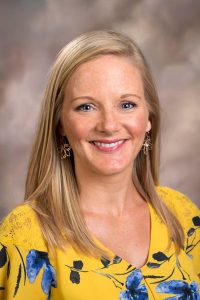First Generation – Keri Mans

Tell us about yourself: In this section were you involved with TRIO?
I was born to very young parents in rural Mississippi, an area in which higher education was not considered or highly valued. For much of my early life, I lived with my mom and grandparents and participated in a rural lifestyle that included farming, hunting, & fishing. When I was growing up, our family didn’t have a lot of money, but I’m lucky to have had food in my stomach and a roof over my head. There was no pre-K available in our area, so my first experience with school was kindergarten. While I know it sounds trite, I fell head over heels in love with school. I never left school, and consider myself fortunate to be able to come to school every day and lead my students as they pursue their goals.
What was it like being a first generation college student? What barriers did you face and how did you overcome them?
I attended Mississippi State University, and in 2004 I earned a Bachelor of Science in Biochemistry and Molecular Biology. It sounds so simple, right? The truth is that I struggled mightily to understand what resources were available to me, and I never came across a program such as TRIO. Not realizing that dropping a class was a possibility, I failed calculus and got a D in chemistry my first semester. I had always done well in school, but suddenly it was abundantly clear that I had no idea how to study: everything had always just come easy to me. One of my greatest college successes, in my opinion, was finding a tutor in the free math lab and spending two hours a day with him until I passed my calculus series. This was a painful process that taught me much about resilience.
My other big challenge in college was figuring out what to do with my degree once I earned it. Thankfully, I had two campus jobs working in research labs and knew that I enjoyed “doing science”. I looked up to my professors for their depth of knowledge and ability to convey it to a bunch of hapless 20-somethings. I reasoned that earning a PhD would allow me the opportunity to continue doing science and hopefully one day become a professor as well.
I entered the University of Alabama at Birmingham in 2004 as a PhD student in the Cellular and Molecular Biology program. My transition to graduate school was no easier than my transition to University life, but the resilience I learned as an undergraduate helped me to persevere. I exited the University of Alabama at Birmingham in 2010 with a PhD in Neurobiology and a fierce determination to ensure that my future students would be well-prepared for their next steps.
What kind of support did you receive from friends and family?
My mom has always been my biggest champion. When I was a pre-teen and my parents divorced, my mom earned an Associate’s Degree to better support our family. I remember riding in the car with her to school and calling out flashcards so she could study as a non-traditional student. It was then that I first thought of becoming a teacher, though I never thought that I would actually become a professor!
Whenever I felt discouraged, I remembered those days and how hard my mom had to work for her Associate’s while raising two kids alone. I called her many times during both my undergraduate and graduate days insisting that I couldn’t take another minute. She used a lot of tough love (sometimes really tough love!) to push me through. My mom and step-dad always told everyone how proud they were of me, so it would have been hard to let them down!
In addition, I made some of my longest-lasting friendships in graduate school, and that’s where I met my husband! At first I was intimidated by being around so many intelligent people who obviously came from families where a college education was commonplace. As I learned to trust those around me, they became a huge support as we all finished our graduate degrees together.
What can GS do better in support of first Generation Students?
First, I’ll say that students have so many resources at Georgia Southern, such as TRIO, the writing center, and the SMART tutoring center. In addition, these resources are easy to locate and to use. I do think that first-generation students are more hesitant to utilize these resources and might simply need encouragement! I have walked many students to the SMART center who were too nervous to walk in the door and try it out. Empowering students to use tools available to them doesn’t always have to be a huge thing; sometimes it’s as simple as a conversation and some encouragement to empower them to use their resources.
Give encouraging words to 1st Generation staff and students who haven’t realized their academic dreams.
I think it’s important for each person to have at least one mentor as they travel their academic journey, whether it is a professor, a family friend, tutor, or colleague. Further, I’d encourage everyone to define success for themselves, rather than letting someone else define it for them. Realize that your definition of success can change, and that it’s never ever too late to try something new.
Last updated: 2/10/2022
